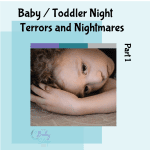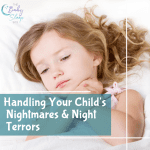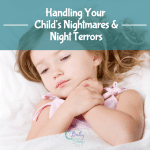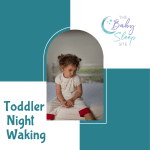
Welcome to part 2 of the Night Terrors and Nightmares Series. If you are just joining us, you might want to start with part 1 where I go over night terrors in babies and toddlers.
What are Nightmares?
Nightmares are very scary dreams. They usually start as a normal dream and then they take a turn for the worst. We don’t remember every dream or nightmare. It’s only when we wake up at the end do we remember them, even if we just wake up briefly.
What age do nightmares start?
This, they don’t know for sure, but they do know by one year old, a child can definitely have a nightmare. It makes sense that it can and does happen sooner, but it’s hard to say how complex a dream can be at one day, one month, or 6 months old, but since nightmares occur during our “active sleep” (during rapid-eye-movement (REM) for those who want to know a bit more about the technical terms), it is possible even your newborn can have a dream and therefore, a nightmare. Newborns spend a good amount of time in this stage of sleep.
Since a one year old can’t talk or express himself that well, it’s hard to know just how complex his dreams are, but by two years old, when the imagination has really started to come alive, nightmares can get very specific. However, at this age, although they might understand a nightmare is just a dream and have an idea about what a dream is, when he wakes up, he might not fully understand the dream is over and still remain scared for a bit later.
As your child gets older, the understanding between dream and reality will get better and by 5 years old, she will have a much bigger grasp of the difference between dream and reality. Even when your child is older, it doesn’t mean the dreams won’t be scary, but they may not always need you to come for help (which I’m sure is a bittersweet feeling).
All children are different in their development, so the age that your child may or may not need you after a nightmare will vary.
Why do we have nightmares?
Everyone has nightmares at one time or another, but those with more emotional tension or upset during the day will probably have more nightmares, because nightmares usually come about from the daily struggles in your day. This will also depend on how sensitive the dreamer is. Nightmares are a very normal part of your child’s development and working through daily life struggles.
Night terrors vs. Nightmares
We learned last week when I described night terrors, that it’s important to distinguish night terrors from nightmares because how we resolve them will be very different. Night terrors or other confusional events will not result in your child being fully awake afterward, but with a nightmare, he will be and he will be clearly frightened.
With Night terrors you usually figure out your child is having one in the middle of it happening, but in a nightmare, you will only know it happened after it’s over and your child is awake and scared. It is also important to note that nightmares usually occur in the second half of the night while night terrors typically happen within the first few hours of the night. It is often hard to settle or calm a child having a night terror and he isn’t fully awake barely responding to you, but once it’s over he goes back to sleep quickly. After a nightmare, your child will feel comforted by you, but may or may not go back to sleep as easily depending on the age of your child and how scary the dream was.
Nightmares can be very scary and there are ways to try to limit night terrors and nightmares, how to handle each when you’re in the thick of things, and how to discourage any bad habits from forming. If you need help dealing with your toddler’s night terrors or nightmares, I encourage you to consider purchasing our comprehensive e-Book on toddler sleep, The 5-Step System to Better Toddler Sleep. You can also contact us for more info. We’d love to help!








